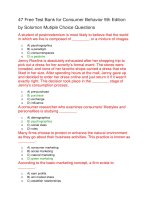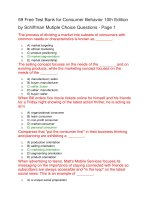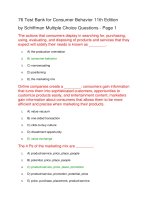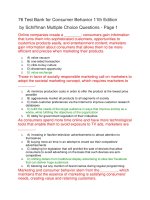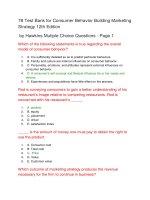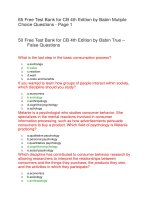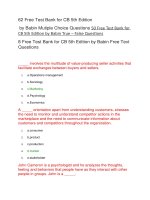59 test bank for consumer behavior 5th edition
Bạn đang xem bản rút gọn của tài liệu. Xem và tải ngay bản đầy đủ của tài liệu tại đây (44.67 KB, 13 trang )
59 Test Bank for Consumer Behavior 5th Edition
by Hoyer Mutiple Choice Questions - Page 1
Borrowing
1.
2.
3.
4.
5.
a. is a symbolic form of gift giving.
b. follows the disposition phase of consumer behavior.
c. affects why consumers use the product.
d. is a form of acquisition that is a major problem for retailers.
e. is a consumer behavior that does not concern marketers.
Baby shampoo advertising that includes adults using the product
may help increase sales by suggesting the consumer
1.
2.
3.
4.
5.
a. use the product more frequently.
b. use larger amounts of the product.
c. use the product for longer periods of time.
d. use the product in a different location.
e. purchase the product in a different location.
Antacid marketers find their best sales period is during the
Christmas holiday season, when consumers do just a little too much
indulging. This is an example of
1.
2.
3.
4.
5.
a. seasonal sales promotions.
b. seasonal variations in consumption.
c. cycles in the disposition process.
d. the dynamic process of consumer behavior.
e. the unusually large effect of mass-consumer purchasing on the digestive
process.
An advertising campaign suggested multiple uses of baking soda.
This is an example of increasing frequency of usage to
1.
2.
3.
4.
5.
a. decrease product sales.
b. increase brand awareness.
c. affect the way in which we acquire goods.
d. increase product sales.
e. increase consumer awareness of the product category.
Thanksgiving products are an example of how __________ has
symbolic implications.
1.
2.
3.
4.
a. usage
b. disposition
c. offering
d. acquisition
5.
e. marketer-control
The consumer behavior process occurs over time as the consumer
acquires, uses and disposes of the product. This is part of
1.
2.
3.
4.
5.
a. a one-way process.
b. a process isolated by active behaviors that are reactive.
c. the memory network.
d. a dynamic process.
e. the judgment framework.
Some consumers are interested in collecting rather than
____________ items, even if the items no longer serve a functional
purpose.
1.
2.
3.
4.
5.
a. renting
b. disposing
c. bartering
d. borrowing
e. trading
The first decision Bob must make about dessert after dinner is most
likely
1.
2.
3.
4.
5.
a. why to get dessert.
b. when to get dessert.
c. whether to get dessert.
d. what to get for dessert.
e. how long he should spend eating dessert.
Studying this type of consumer behavior allows marketers to
provide a need for customers who are concerned about what to do
with a product after usage.
1.
2.
3.
4.
5.
a. Usage
b. Disposition
c. Acquisition
d. Product
e. Switching
All of the following are ways of acquiring an offering except
1.
2.
3.
4.
5.
a. buying.
b. borrowing.
c. finding.
d. dispensing.
e. bartering.
The process by which a consumer comes to obtain an offering is
known as
1.
2.
3.
4.
5.
a. usage.
b. disposition.
c. offering.
d. acquisition.
e. marketer-control.
Nate searches carefully for his coffee beans before buying them.
He has many uses for the coffee after purchasing. He makes hot
and iced coffee, coffee ice cream, and even makes coffee cake.
After using the coffee, Nate uses the grinds in the garden. Nate's
behavior is an example of consumer behavior as a
1.
2.
3.
4.
5.
a. static process.
b. randomized process.
c. dynamic process.
d. series of fixed outcomes.
e. process that focuses primarily on acquisition.
Kimberly agreed to sing in return for a book she had wanted. This is
an example of
1.
2.
3.
4.
5.
a. buying.
b. borrowing.
c. finding.
d. dispensing.
e. bartering.
The __________ field is one that looks at the totality of consumers’
decisions with respect to acquisition, consumption, and disposition
of goods, services, time, and ideas by human decision-making units
over time.
1.
2.
3.
4.
5.
a. anthropology
b. consumer behavior
c. economics
d. psychology
e. management
Disposable cameras were a flop at first. Consumers doubted that
they could take good pictures. When disposable cameras were
repositioned “for those who forgot their camera on vacation” or “for
those who do not want to ruin their expensive camera on the beach
or slopes” sales increased. This could be best thought of as a
successful example of marketers understanding
1.
2.
a. how consumers dispose of cameras.
b. why consumers acquire cameras.
3.
4.
5.
c. media marketing techniques.
d. the limits of disposable optical engineering.
e. the information search process.
Internet technology, mail-order technology, and home shopping over
the phone are all examples of
1.
2.
a. symbolic consumption.
b. new technology that changes the types of products that consumers will
order.
3. c. changes in information technology affecting where we can acquire goods.
4. d. new technology that primarily affects the disposal of products.
5. e. examples of personal selling.
Sam collects Pepsi and Coke bottles. He also uses old cola to clean
the rust off his car. These are two examples of how to
1.
2.
3.
4.
5.
a. dispose of a product.
b. keep an item after it has lost its original usage.
c. collect items in creative ways.
d. get rid of items temporarily.
e. get rid of items permanently.
Ted realized that his old threadbare towel was no longer serving
him the way it used to. In order to dispose of this offering, he has a
choice to
1.
2.
3.
a. acquire the item permanently, keep it safe, or get rid of it permanently.
b. dispose of the item, acquire it, or get rid of it temporarily.
c. find a new use for the item, get rid of it temporarily, or get rid of it
permanently.
4. d. acquire the item temporarily, dispose of it, or keep it.
5. e. acquire the item, keep it, or get rid of it temporarily.
A(n) offering is a product, service, activity, or idea
1.
2.
3.
4.
5.
a. that is acquired but not used by consumers.
b. that is used but not acquired by consumers.
c. offered by a marketing organization to consumers.
d. marketed by a firm but not yet available in the marketplace.
e. in the marketplace but not yet accepted by consumers.
A retailer gives cash or credit toward a better computer game in
return for a customer’s older computer game. This transaction is
known as
1.
2.
3.
4.
a. purchasing.
b. consumption.
c. gift giving.
d. trading.
5.
e. borrowing.
Spreading negative word-of-mouth is an example of how
consumers’ usage of a product
1.
2.
3.
4.
5.
a. can influence other consumer behaviors.
b. impacts disposition.
c. has hedonic implications for acquisition.
d. has symbolic implications for disposition.
e. will lead to other offerings in the marketplace.
Hilbert carefully recycles all of his paper and plastics after using
them. In consumer behavior, this is referred to as
1.
2.
3.
4.
5.
a. conspicuous consumption.
b. conspicuous acquisition.
c. relevant marketing.
d. disposition behavior.
e. consumer offerings.
George’s manager’s birthday is tomorrow. As George enters the
shopping mall, he must think of something to buy for her. What is
the primary difference between the decisions he will make now and
those he would make entering a shopping mall to purchase for
himself?
1.
2.
3.
4.
5.
a. Disposal is involved in the process.
b. The brand name of the products is involved.
c. There are purchasing situational differences.
d. There are advertising viewing differences.
e. One individual must assess another individual’s wants.
The advent of 24-hour grocery stores, health clubs, and catalog
ordering systems are all examples of the provision of
1.
2.
3.
4.
5.
a. flexibility in the timing of acquisitions.
b. interactive marketing.
c. chain-store marketing.
d. easily accessed disposal.
e. expanded product usage and functions.
A big product-usage problem for marketers is that consumers
become dissatisfied because
1.
2.
3.
4.
5.
a. the product is used incorrectly.
b. too little of the product is used.
c. too much of the product is used.
d. the product is used at the wrong time.
e. the product is not used for a sufficiently long period of time.
In testing the consumption of tortilla chips, a company discovers
that many consumers will eat an entire five-ounce bag in one sitting.
What additional knowledge of consumers’ usage could increase the
company’s sales?
1.
2.
3.
4.
5.
a. New biodegradable packaging is developed to appeal to an
environmentally conscious segment of consumers.
b. Humorous advertising campaign increases awareness of the brand.
c. Research shows that consumers will also eat a seven-ounce bag in one
sitting.
d. Tests determine that increasing the size of the logo on the package better
connects the product with advertisements.
e. Small drops in price bring large increases in sales.
The “orange juice isn't just for breakfast anymore” campaign is an
example of
1.
2.
3.
4.
5.
a. encouraging the collection of products.
b. changing why people use orange juice.
c. changing how people use orange juice.
d. changing whether people use orange juice.
e. affecting when people use orange juice.
The increase in the home delivery of food, videos, and convenience
goods most directly affects
1.
2.
3.
4.
5.
a. increasing prices.
b. developing smaller package sizes.
c. stimulating negative word-of-mouth.
d. where consumption is done.
e. using generic brand names.
The consumer behavior field looks at
1.
2.
a. how consumers are the most important element of the marketing mix.
b. the totality of consumers’ decisions with respect to acquisition,
consumption, and disposition of goods, services, time, and ideas by human
decision-making units over time.
3. c. only the behavior of consumers while in a retail environment.
4. d. the purchases of tangible goods but not services.
5. e. the persuasion of individuals to increase consumption at one period of time.
Some times there are many people involved in an acquisition
decision and they may take on different roles. Travis and his family
are buying a new big-screen television. He has research different
brands, models and prices of televisions from the Internet. Bob’s
role in the group decision would be the role of the ______.
1.
a. buyer
2.
3.
4.
5.
b. information gatherer
c. influencer
d. disposer
e. user
59 Free Test Bank for Consumer Behavior 5th Edition by
Hoyer Mutiple Choice Questions - Page 2
To recognize and guard against misleading advertising, it is most
important to
1.
2.
3.
4.
5.
a. understand the acquisition process.
b. understand how consumers comprehend and categorize information.
c. target the market.
d. understand high-involvement consumer choice and judgment processes.
e. alter the memory formation process.
Individuals who band together to protest increasingly loose morals
and mocking of families on television shows are best known as
a(n)
1.
2.
3.
4.
5.
a. consumer cooperative.
b. rating band.
c. regulator.
d. advocacy group.
e. public service.
Clarke is nine years old and wants to be a professional football
player when he grows up. He tries to emulate the behavior of
National Football League (NFL) stars and pays attention to ads that
use NFL players as spokespersons. In marketing terms, NFL
players are ___________________ to Clarke.
1.
2.
3.
4.
5.
a. a reference group
b. a lifestyle emulator
c. a motivational icon
d. a subculture
e. really, really cool
An auto manufacturer starts an advertising campaign that stresses
the benefits of purchasing a new car every five years so that
consumers who are driving an older car will start to want to
purchase an automobile. This is an example of a company
appealing to what phase of the consumer decision-making
process?
1.
a. recognition and recall
2.
3.
4.
5.
b. categorization and comprehension
c. consumer behavior outcomes
d. problem recognition
e. exposure and perception
The external signs we use, consciously or unconsciously, to
express our identity are known as
1.
2.
3.
4.
5.
a. personal signs.
b. consumption networks.
c. social flags.
d. open signals.
e. symbols.
In marketing, positioning refers to
1.
2.
3.
a. where the brand is placed on the stores’ shelves.
b. how the consumer perceives the brand in relation to the competition.
c. where to place marketing communications for a brand so it capture the
consumer’s attention.
4. d. how to develop attractive packaging to entice consumers to try the brand.
5. e. None of the above is true.
A consumer wants to purchase a new automobile. Having three
years of experience as an amateur auto mechanic, she has the
_________ to learn as much as possible about her decision.
1.
2.
3.
4.
5.
a. ability
b. perception
c. motivation
d. exposure
e. opportunity
ADCO paper clips just hired a consumer behavior expert. They
hoped that she would help provide consumer information about the
paper clip market. They also hoped she would help them to design
marketing programs that would
1.
2.
3.
4.
5.
a. provide logistical efficiency.
b. increase production.
c. bring about the exchange process.
d. streamline the managerial decision-making process.
e. facilitate communication between divisions in the firm.
Kimberly really wants to go on a hiking trip to Colorado. She has
been climbing with her family for several years and now she is off
from school for the summer. As an internal consumer process, this
is an example of having
1.
2.
3.
4.
5.
a. motivation, ability, and opportunity.
b. exposure, disposal, and memory.
c. acquisition, usage, and disposal.
d. perceptiveness, retention, and memory.
e. exposure, disposal, and retention.
Jim had a group of people to which he always compared himself for
information about life, what to buy, who to date, etc. These people
can be best thought of as a(n)
1.
2.
3.
4.
5.
a. articulation network.
b. reference group.
c. ethnic group.
d. social support group.
e. subcultural framework.
Problem recognition occurs when we
1.
2.
3.
4.
5.
a. form an attitude.
b. form affect toward an object.
c. expose ourselves to persuasive information.
d. realize that we have an unfulfilled need.
e. categorize information in a schematic framework.
Whitney has decided to have her ears pierced so that she could
wear pretty earrings. However, after the piercing, her ears became
infected. Her expectations of the experience were not met, thus
Whitney was
1.
2.
3.
4.
5.
a. satisfied.
b. complacent.
c. dissatisfied.
d. evaluative.
e. normative.
Ed was exposed to an ad for a new brand of potato chips, but only
motivation will lead him to
1.
2.
3.
4.
5.
a. be exposed.
b. perception.
c. disposition.
d. pay attention.
e. the psychological core.
A consumer wants to purchase a new automobile because her
present automobile has lost its engine. This consumer probably has
a high level of
1.
a. ability.
2.
3.
4.
5.
b. perception.
c. motivation.
d. exposure.
e. opportunity.
All of the following are domains of consumer behavior except
1.
2.
3.
4.
5.
a. the psychological core.
b. the process of making decisions.
c. the consumer's culture.
d. consumer behavior outcomes.
e. behavior within the firm.
Reference groups are a group of people
1.
2.
3.
4.
5.
a. we go to when we want to increase our knowledge of social influence.
b. we compare ourselves to for information about ourselves.
c. who are experts to whom we can ask brand and product information.
d. who are subcultural groups.
e. who are friends or who can refer us to people who will help.
Nathan would only travel to San Clemente if he considered it a
weekend trip and not a long vacation. Thus, it depended on
1.
2.
3.
4.
5.
a. whether he comprehended the choices that were available in his
consideration set.
b. if he paid attention to the choices.
c. how he categorized the product with respect to other choices.
d. how he modified the information that was available to him.
e. if he retrieved the information correctly.
Attitudes do not
1.
2.
3.
4.
5.
a. change.
b. form from exposure to information.
c. relate to choice.
d. form from exposure to advertising.
e. always predict behavior.
The Federal Trade Commission protects consumers from deceptive
advertising by studying how consumers perceive and comprehend
marketing communications. This is an example of
1.
2.
a. academics studying consumers to share information with others.
b. consumers understanding consumer behavior to protect themselves
against unwise product choices.
3. c. an advocacy group understanding consumer behavior to protest unfair
marketing.
4. d. public policy regulators understanding consumer behavior to protect
consumers from unfair marketing practices.
5.
e. marketing managers studying consumer behavior in order to develop
strategies to persuade consumers to buy a specific brand.
Jed considers many criteria when purchasing a new mouse for his
computer. He wants it to be comfortable, functional, and reflect his
personality. He always considers every choice before making a
decision. This decision is known as a(n)
1.
2.
3.
4.
5.
a. acquisition disposal loop.
b. long-term memory retrieval process.
c. high-effort judgment and decision-making process.
d. categorization and comprehension process.
e. memory formation process.
Every year millions of smokers attempt to quit the habit, but
relatively few succeed. To help smokers quit, pharmaceutical
companies developed the nicotine patch. In this situation, an
understanding of consumer behavior helped to
1.
2.
3.
4.
5.
a. segment the market into homogenous groupings of consumer needs and
wants.
b. aid consumers in the product attribute retrieval process.
c. determine consumer satisfaction with the attributes of a product.
d. select a target market from among numerous segments.
e. develop a new product.
In developing marketing strategies and tactics, marketing managers
must first
1.
2.
3.
4.
5.
a. understand consumer needs and wants.
b. formulate strategy.
c. attend to distribution.
d. eliminate the focus on finance in the company.
e. advertise to maximize exposure.
Coca-Cola has decided to bring back the old dimpled green Sprite
bottle, both because Coca-Cola thinks the bottle will attract
consumers’ attention and because it might bring back favorable
memories of the 1960s, when the dimpled bottle was introduced.
This is an example of how consumer behavior can
1.
2.
3.
4.
5.
a. aid in decisions about the product mix.
b. aid consumers in the product attribute retrieval process.
c. determine consumer satisfaction with the attributes of a product.
d. select a target market from among numerous segments.
e. develop a new product.
For many years Excedrin has developed marketing communications
that stress how effective it is as a headache medicine. What type of
marketing strategy is Excedrin using?
1.
2.
3.
4.
5.
a. co-branding
b. product placement
c. product positioning
d. brand extension
e. perceptual mapping
Even if consumers are exposed to information about a product,
there must first be ________ in order for it to have an effect.
1.
2.
3.
4.
5.
a. exposure
b. perception
c. ability
d. opportunity
e. psychological core
A consumer wants to purchase a new automobile. Since she is on
vacation and has some free time, she has the __________ to learn
as much as possible about her decision.
1.
2.
3.
4.
5.
a. ability
b. perception
c. motivation
d. exposure
e. opportunity
Compulsive theft, spending, gambling, and eating are examples of
consumers engaging in
1.
2.
3.
4.
5.
a. unique methods of disposal of products.
b. excessive acquisition.
c. illegal activities in the purchase of goods.
d. excessive consumer motivation.
e. behaviors that will reduce product usage in the long run.
Kimberly is very motivated to choose a good location for her hiking
trip during her Spring Break vacation. Before Kimberly decides on
how to go on her hiking trip, she must first make sure she has
_________ information.
1.
2.
3.
4.
5.
a. perception of
b. attention to
c. a good attitude toward
d. exposure to
e. psychological insight toward
Marketing managers must study consumers in order to determine
which media vehicles to use for advertising. Which of the following
is NOT a media vehicle?
1.
2.
3.
4.
5.
a. television commercials
b. ads in magazines
c. billboards by the side of the road
d. signs on city buses
e. All of the above are examples of media vehicles.
Total Points: 0 correct out of 59
